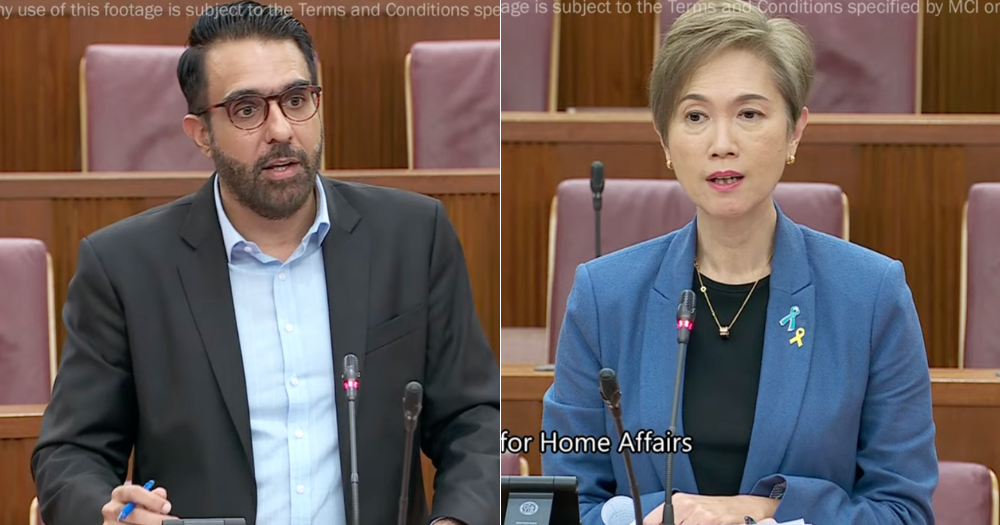Follow us on Telegram for the latest updates: https://t.me/mothershipsg
Second Minister for Home Affairs (MHA) Josephine Teo and Leader of the Opposition, Pritam Singh, debated the criteria for selecting new citizens for Singapore.
During MHA's Committee of Supply debate, Singh posed several questions regarding new citizen selection.
Questions on granting citizenships
Singh asked what Singapore's goals should be when it comes to bringing in new citizens, citing that with the historically low fertility rate, new citizens would be "a critical pillar in the shape of any future Singapore."
Singh said:
"We want those who truly know Singapore and want to embrace the Singapore way of life... Singaporeans do not want new citizens who don't want to live here but only want the power of the Singapore passport for their convenience and a safe and secure environment for their assets and wealth.
We do not want new citizens who are reluctant for their sons to do National Service, and certainly none of us want people only want Singapore citizenship as a stepping stone to another country, but instead, seek those who have a long-term commitment to Singapore. "
Singh used Switzerland as an example where there is a highly specific selection process for new citizens.
In order to be granted Swiss citizenships, applicants need to show “deep commitment” to the country through naturalisation and prove to be “successfully integrated” and know the Swiss customs and ways.
Singh cited that a person must have lived in Switzerland for 10 years and hold a permanent residence permit to be ordinarily naturalised.
The naturalisation process requires applicants to go through a personal interview, which focuses on their knowledge of topics like Swiss geography, history, politics and society.
"Do we have similar requirements?" he asked.
Singh also asked if a working proficiency in English is a criterion for citizenship, saying that this would facilitate "better integration between new citizens and Singaporeans of all races and religions since English is our main language of communication."
He called on the Government to share more details on how new citizenships are granted, as certain aspects of the process and criteria are currently opaque.
Singh asked if there was a points system, and what the considerations were beyond the publicly-revealed criteria of economic contribution, educational qualification, family profile, and length of stay in Singapore
He asked:
"How would the citizenship selection process evolve in the face of the Forward Singapore exercise and a review of the social compact?"
Teo's response
In response to Singh's questions, Teo said that while the ability of an applicant to integrate into Singapore is a consideration, naturalisation tests or interviews are not used.
"One can learn the right answers the immigration authorities want to hear and not actually be integrated with locals," she replied.
Similarly, Teo said that if detailed criteria were shared, it can be abused to inflate an undeserving applicant's chances of success.
Teo explained that Singapore considers various markers of social integration, such as family ties to Singaporeans, length of residency, and whether the applicant studied in national schools or completed National Service.
Applicants must also complete the Singapore Citizenship Journey before being granted citizenship, a mandatory programme for new citizens targeted at improving their understanding of Singapore.
"These measures are by no means perfect, but they have generally served us well," Teo said.
Teo also brought up "unique sensitivities by virtue of history and geography" as most permanent residents (PRs) and new Singapore Citizens (SCs) come from neighbouring regions.
"We do not reveal our detailed criteria or disclose country-specific figures on our PR and SC, as this information could be misinterpreted or misused by others to stir up bilateral and domestic sensitivities," Teo said.
Singh pushed for more information on what specific sensitivities Teo referred to, such that revealing country-specific information could be misinterpreted, saying that the latest census provides information on the place of birth of PRs and citizens, in 10-yearly intervals.
Teo explained that the information could be misinterpreted by suggesting that Singapore is friendly or not friendly to specific nationalities and ethnicities.
"I think we have said this on previous occasions," she said. "I don't have anything new to add to the previous explanations that have been provided."
English proficiency as a criteria
Teo questioned Singh if he was advocating for an English proficiency test to be conducted before someone can be considered for PR status or citizenship.
Singh replied in the affirmative, saying it would be a helpful tool to improve integration, citing a recent census report which stated that English is increasingly used in Singapore — even more widely spoken in 2020 than it was in 2010.
Teo expressed surprise at Singh's stance.
She pointed out that most applicants for PR status or citizenship would have been in Singapore for years. If so, for them to have proficiency in English would be "not surprising", making a test irrelevant.
Teo said those who do not have a good command of English are likely to be spouses of citizens or other PRs.
Teo asked whether Singapore is implying that it does not welcome these foreign spouses. She also asked rhetorically to what extent a test of English can be applied to foreign spouses and whether it is to prevent them from being considered, and whether such a test would be helpful.
She said:
"On the ground every day, we meet with residents who cannot speak a word of English, and I don't think anyone would suggest that they are any less integrated to Singapore society."
Top photos via MCI's YouTube
If you like what you read, follow us on Facebook, Instagram, Twitter and Telegram to get the latest updates.
